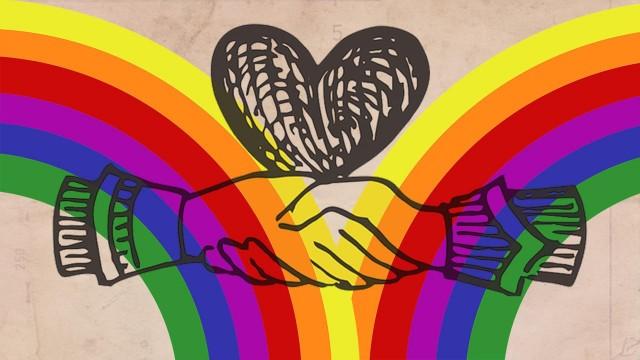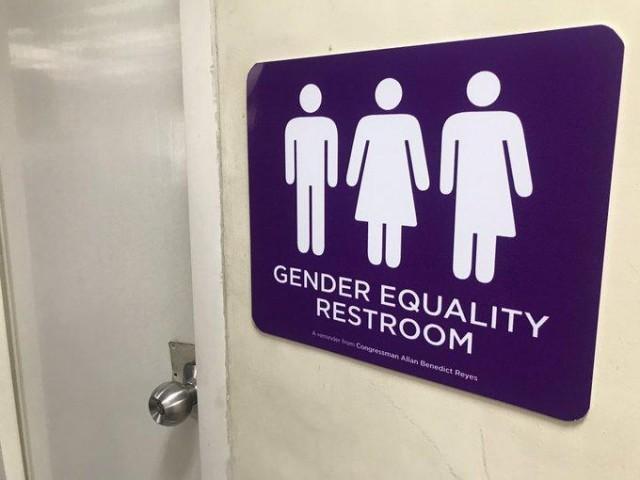After a transwoman was barred from using the female restroom, how do we move forward in a more inclusive manner?
Last week, transwoman Gretchen Diez was refused entry to a female restroom in a Quezon City mall. She was handcuffed, brought a police station, where a complaint for unjust vexation was supposed to be filed against her.
Later on in the evening, however, the charges were dropped, with the restroom custodian apologizing.
The next day, Farmer's Plaza, where the incident took place, released a statement through Araneta, apologizing to Gretchen and explaining the custodian was not an employee but a third-party contractor.

The incident quickly spurred a heated discussion, with members of the lesbians, gays, bisexuals, transgenders, queers, intersexuals and asexuals (LGBTQIA+) community and its allies condemning the incident and lawmakers and politicians taking the opportunity to discuss the matter and look for solutions.
One would think there is growing support and understanding for the LGBTQIA+ community.
Witness: the month-long pride celebration last June saw the biggest Metro Manila pride march in its history yet. Establishments like the Araneta Center voiced their support for the community by painting its pedestrian lanes with rainbow colors. There were a lot more fashion retailers that released pride collections this year, too.
Beyond pride month, over 27 cities and provinces nationwide have already passed anti-discrimination ordinances, including Quezon City. Senator Risa Hontiveros just refiled the Sexual Orientation and Gender Identity and Expression (SOGIE) Bill.
But Tuesday’s incident and the discussions in its wake highlighted just how misunderstood members of the LGBTQIA+ community remain to be.
Proposed Solutions
One of the first comments came in the quip of Senate President Tito Sotto. “Why that lengthy letters? Why not just Homo sapiens?” He asked.
RELATED: Confused by LGBTQIA+ tag, Sotto asks: 'Why not just Homo sapiens?'
According to Evan Tan a board member of the LGBT Chamber of Commerce, there isn’t exactly anything wrong with what Sen. Sotto said except, “it sweeps under the rug the issue of representation. It deludes the discourse and makes the community disappear.”
After decades of not being heard, of not being seen, of having to hide, the LGBTQIA+ community seeks to be recognized by and be represented in society.
“The reason we’re complaining is because the structure isn’t equal. There is inequality at play, [which is why] we need visibility and representation,” Tan continued.
Which is exactly what the different letters and the plus sign is for. In her privilege speech, Sen. Risa Hontiveros explained, “May plus po dahil natututunan natin about human sexuality, maraming kulay, shades, so the spectrum may forever be refined.”
Tan offers a simple solution he personally follows: “If it’s becoming too confusing, for me personally, I just say LGBT+. The plus sign acknowledges the other identities.”
Another proposed solution came from 1-PACMAN party-list representative Eric Pineda, who said having a 3rd restroom especially for the 3rd sex might be the answer.
But according to Gretchen Diez, “That is not what we need. We don’t need additional infrastructure. We need acceptance. We need understanding."
“I am for equality and I think that producing a third bathroom does not help in our fight against discrimination,” Diez added.
Besides, Tan says this solution reeks of shades of discrimination, which is the very thing we are all trying to erase.
Better than building a third restroom, Executive Director of EnGendeRights, Atty. Clara Rita Padilla suggested the Department of Labor and Employment should release a circular stating that all companies throughout the Philippines designate a toilet for all genders, even without a law.

Passing the Law and Educating the Citizens
But passing the SOGIE Equality Bill remains the biggest help and the biggest step in turning this discrimination around.
“Kailangan mo talaga ng national framework sa mga ganitong batas. LGU ordinances puwede, pero kailangan talaga ng isang malawakang policy, or bill katulan ng Anti-Discrimation Bill,” the LGBT Chamber of Commerce said.
It added that such national framework should be able to guide the local government units in implementing their local anti-discrimination laws, such as QC’s Gender Fair Ordinance, which was put in place after transwoman Mara dela Torre filed a complaint against discrimination in the work place. The incident became the banner story for QC’s anti-discrimination ordinance.
But while the ordinance has been in place since 2014, Tuesday’s incident clearly shows that having laws in place isn’t enough.
“Because you can always implement but it doesn’t mean people will understand,” Tan said.
Atty. Padilla, who is also Quezon City’s gender consultant to the office of the Mayor, urged the city to revisit the provisions to have mandatory SOGIE training in all schools and companies. “Right now [kasi], encouraged lang. Schools and companies should have mandatory trainings — hindi lang encouraged.”
“Knowing SOGIE naman, given naman na hindi lahat ng tao, alam yan,” she added.
“We can’t expect everybody to know what the SOGIE Bill says for instance, or in QC, to know what’s in the Gender Fair Ordinance. Employers should communicate it to its employees and contractors by holding orientations,” echoed Tan.
Angel Romero, an advocate and owner of LGBT-friendly restaurant Kapuwa Bar & Bistro in Quezon City, says “’Wag tayo magalit doon sa mga taong hindi alam. I think it’s more about educating them and making sure we pass the SOGIE Bill,” Romero adds.
Of all the proposed solutions, education is perhaps the easiest to do but is the one thing that isn’t done enough.
In 2018, the LGBT Chamber of commerce conducted the very first SOGIE inclusivity index in the Philippine workplace and found that among 100 companies, there isn’t a single Filipino company with SOGIE-inclusive policy. And a huge 57% have no plans to create SOGIE-inclusive policies in the future.
This means that rights of employees who belong to the LGBT+ community isn’t just not protected, but that companies catering to the general public — like malls — have employees who aren’t trained to relate to members of the LGBT+ at all.
“Organizational trainings are very important. Yes, there is a gender fair ordinance in QC, but employers need to communicate it to its employees, and even their contractors. This is why orientation seminars are important,” Tan repeated.
It Can Be Done
It’s not as daunting as it seems. Romero has done it, and easily too. Her restaurant’s doors are adorned with the rainbow flag, to tell members of the LGBT community they are welcome and safe there.
Inside the restaurant are gender-neutral restrooms, too. It has even partnered with non-profit organization Love Yourself for an HIV awareness campaign.
But even more noteworthy is how her all-straight staff has been SOGIE-oriented and trained to handle people of all genders and preferences. All of them are instructed to refer to each guest as “boss” so as not to offend anyone with wrong pronouns.
“Even before mag-start yung employee, I do a one-on-one SOGIE training with them. If it’s been updated, I share the news. Even local ordinances, para the employees know,” Romero continues, adding she holds regular meetings with staff on top of the one-on-one orientation.
“We are all still coming to terms with it as a society, so people who know the nuances of LGBT, we have to communicate and educate,” Tan said.
And if we’re not getting as much training from our employers, organizations, and schools, we can always educate ourselves. There is a surplus of materials we can read, Tan says, like the websites of the World Health Organization and the Human Rights campaigns.
“There has to be an effort to educate ourselves and help educate others,” the LGBT Chamber of Commerce said.
"Those who know should help educate, and those who do not, should not be dismissive," Tan reminds.
“While being good citizens, we must be able to support very good legislature and laws for equality and diversity, which in this instance is the Anti-Discrimination Bill,” the LGBT Chamber of Commerce said.
And then they turned inward: “On a personal, individual level, people should see other people as human beings.”
People don’t need laws for that. — With reports from Jessica Bartolome and Kaela Malig/LA, GMA News



